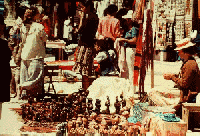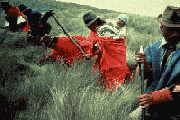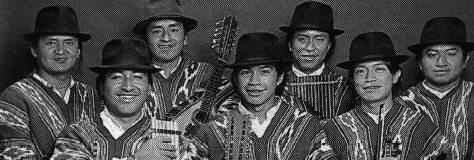
Alberto Taxzo, Quichua medicine man from the Ecuadorian Andes
sang a beautiful song to the Sun and the Creator at the UN recently:

Alberto Taxzo, Quichua medicine man from the Ecuadorian Andes
sang a beautiful song to the Sun and the Creator at the UN recently:
"We must work with sacred powers and understandings
today,
and every day into the future, to heal ourselves and our world.
The condor and the eagle have met. Now is the time. We must choose our pathway
now."

I dedicate this home page to the people of Otavalo and especially to:

whose Andean folk group "Ecuador Inkas"

personifies the very essence and soul of the indigenous people for whom this web site was created.
Anyone who has the honor to hear this music will know what I mean. The sounds of Marcelo's flute truly capture the heart and soul of what it means to be an "American" (a true citizen of the Americas).
Mother Earth (Pachamama) hears all of her people.
"Ali Shungu" (good heart)
Marcelo comes from the town of Otavalo, two hours north of Quito, Ecuador. Otavalo is located in a spring-like valley at 9,203 feet high, between the Imbabura and Cotacachi volcanoes. There are approximately 40,000 Otavaleños living in this area, plus 5,000 more who live in Colombia, Venezuela, Spain, and other parts of Ecuador. Otavaleños are recognized world-wide for their famous felt and straw hats, knitted sweaters, and daily handicraft market. The Saturday market is the most well-known in all of Ecuador.
My people come from high up in the mountains of Ecuador. We are direct descendents of the Inkas and the Caras or Caranqui, who came to Ecuador from Colombia a thousand years ago.
The name which we call ourselves is "Runa", meaning "The People".
Otavalo is one of many Indian towns such as Peguche, Illuman, Agato, San Roque, and Carabuela, and is near many lakes: Cuioccha, Mojanda, and Yaguarcocha. Yaguarcocha is known as the "Lake of Blood" because of the many Incan battles fought there.
Taita Inti and Taita Quilla are what we call father sun and moon in our language, which is Cara. The mountains in our valley are called Taita Imbabura and Mama Cotacachi (also known as Warmi Rasu: snow lady). Their son's name, Urku Mojanda, is given to another mountain peak in the area. We also speak of "Mama Puyo", mother cloud.
Although some of us live in towns,
"WE STILL ARE PEOPLE OF THE EARTH".